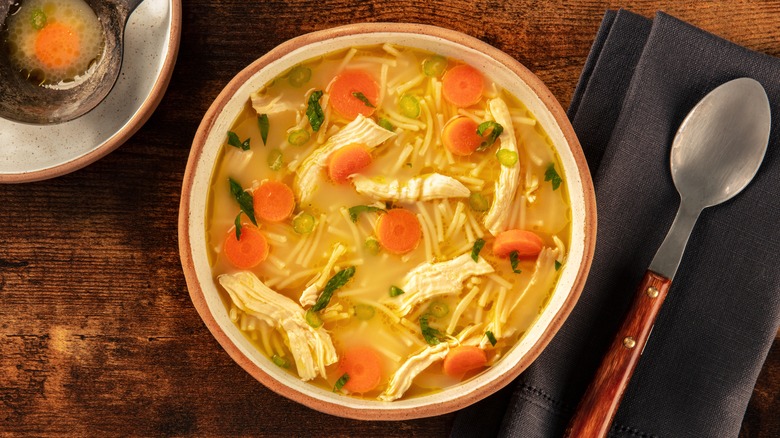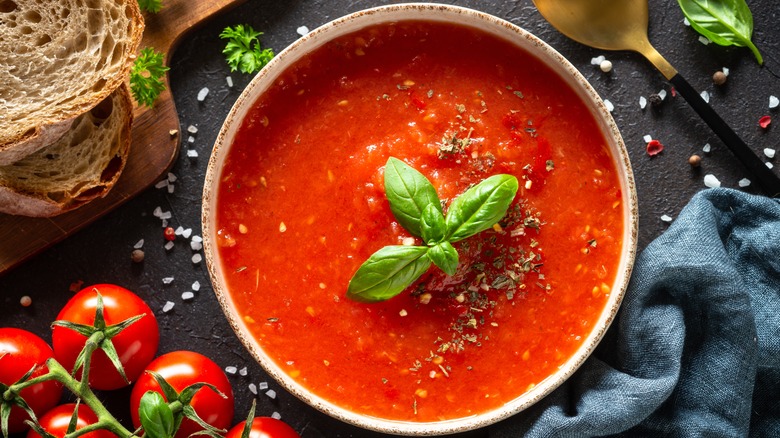The One Ingredient That Transforms Your Chicken Noodle Soup
In the United States, few dishes are as synonymous with comfort food as chicken noodle soup. Whether it's a cold, gloomy day, you're feeling ill, or just need to wrap yourself around a warm soup, chicken noodle soup is there to comfort you. With a selection of basic ingredients and relatively simple prep requirements, chicken noodle soup can come together easily even if you have to make it yourself while you're not at your best. But that ease doesn't mean that your soup can't be the greatest version of itself. Adding one simple ingredient to your chicken noodle soup can transform it into something truly special: lemon juice.
Lemons are such a typical sight in kitchens and restaurants that we sometimes forget just how magical they can be. And, in part, that's because it's easy to misuse them. If you dump in some lemon juice with the broth when you start cooking a soup, then by the time you serve it up, the vibrancy it can bring to your dish will have disappeared or (worse) turned to bitterness. When you add lemon juice to your soup is crucial. Lemon zest early on is fine, but the juice will work best if added after you remove your soup from the heat. If you have cooked enough soup to warm some up later (which you should absolutely do), add the lemon juice only to the portion you serve up so that when you reheat the rest of the soup you don't run afoul of that same bitter problem.
Why lemon juice makes chicken noodle soup brighter
When you put lemon into a dish or over a plate of food at a restaurant, people will say it tastes brighter, has a fresher flavor, or just has a little "zing." While those are all apt descriptors, why does it really improve certain dishes in that way? What it really comes down to is a careful balancing of flavors. Not all dishes will benefit from a little extra lemon, and it's easy to end up with too much of that "zing." The properties of chicken noodle soup mean that it's a particularly good candidate for that lemony boost.
The easiest way to understand why lemon is such a great ingredient to add when you're serving up your chicken noodle soup is through Samin Nosrat's "Salt, Fat, Acid, Heat," theory. When you're cooking, you want to apply the right balance of those four "cardinal directions" of the kitchen. When you make chicken noodle soup, three of these ingredients are naturally present. The salt comes from the chicken broth (most store-bought broths will have high sodium, and if you're making your own you'll want to season well anyway). The fat comes from the chicken (thighs makes a great chicken soup, and some recipes will call for added schmaltz). And the heat in chicken noodle soup is fairly self-explanatory. What you need to add to balance your chicken noodle soup is a little acid, and lemon juice is a great ingredient to add that brightness.
Is lemon the best way to brighten soups?
While they might taste just fine without it, a huge range of soups can get a boost from this easily added zing. If you want to add some brightness to your soups, then it's hard to go wrong with lemon juice. However, while lemon juice is the best ingredient to brighten your chicken noodle soup, the best ingredient for other soups is going to vary.
The ingredient to add that freshness to your soup is always going to be acidic. For other types of soup, experimenting with other types of citruses can be a great win. Lime juice works especially well with Thai dishes and other Asian soups, for example. On the other hand, next time you make tomato soup, by itself or for dunking grilled cheese in, try blending in some red wine vinegar or sherry vinegar to add a whole new dimension.


